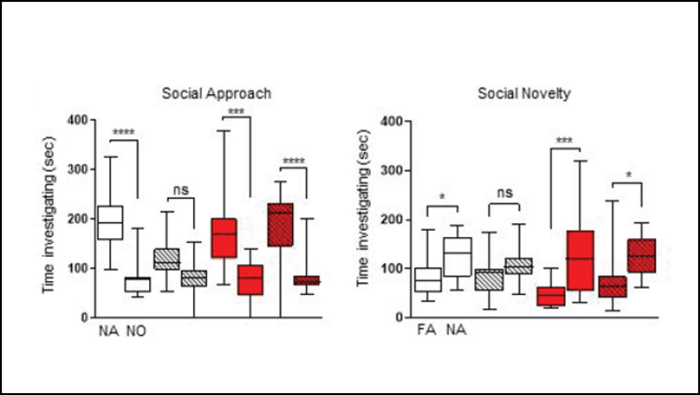Timing is key when treating developmental disorders. Blocking an overactive signaling pathway during the first five weeks of life prevents autism symptoms from ever developing in mice, according to new research published in JNeurosci.

Credit: Gibson et al., JNeurosci 2021
Timing is key when treating developmental disorders. Blocking an overactive signaling pathway during the first five weeks of life prevents autism symptoms from ever developing in mice, according to new research published in JNeurosci.
The brain develops capabilities, like language, during specific spans of time called critical periods. The symptoms of disorders like autism arise during a set critical period; administering a targeted intervention only during the critical period could prevent the disorder from ever taking shape without the burden of a life-long treatment.
Gibson et al. compared intervention timing in a genetic mouse model of Tuberous Sclerosis Complex (TSC), a neurodevelopmental disorder with high rates of autism spectrum disorder. The research team administered the drug rapamycin to inhibit mTOR signaling, a pathway that is overactive in people and animals with TSC. After four weeks of treatment starting at one week of life, mutant mice displayed normal social behaviors and normal activity in cerebellar Purkinje neurons, even after four weeks without treatment. These results raise the possibility that treatment covering critical periods of development could prevent autism symptoms from ever manifesting. As TSC is often diagnosed in utero in humans, defining these critical periods may provide an opportunity to prevent development of autism behaviors.
###
Paper title: A Critical Period for Development of Cerebellar-Mediated Autism-Relevant Social Behavior
Please contact [email protected] for the full-text PDF and to join SfN’s journals media list.
About JNeurosci
JNeurosci, the Society for Neuroscience’s first journal, was launched in 1981 as a means to communicate the findings of the highest quality neuroscience research to the growing field. Today, the journal remains committed to publishing cutting-edge neuroscience that will have an immediate and lasting scientific impact, while responding to authors’ changing publishing needs, representing breadth of the field and diversity in authorship.
About The Society for Neuroscience
The Society for Neuroscience is the world’s largest organization of scientists and physicians devoted to understanding the brain and nervous system. The nonprofit organization, founded in 1969, now has nearly 37,000 members in more than 90 countries and over 130 chapters worldwide.
Journal
JNeurosci
DOI
10.1523/JNEUROSCI.1230-21.2021
Method of Research
Experimental study
Subject of Research
Animals
Article Title
A critical period for development of cerebellarmediated autism-relevant social behavior
Article Publication Date
21-Feb-2022




